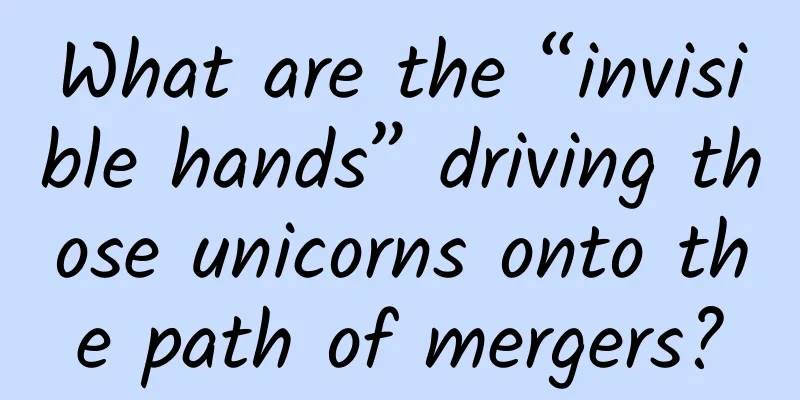What are the “invisible hands” driving those unicorns onto the path of mergers?

|
Paypal merged with X.com between February and March 2000. At that time, neither party could have anticipated what would happen next: at the end of that year, the Internet bubble burst, the Nasdaq index plummeted, a large number of startups went bankrupt, and the capital market was cold. Before the merger, Paypal and X.com, two online payment startups, were competing fiercely. Interestingly, their marketing methods for acquiring new users are not unfamiliar today, and even seem "ahead of the times." X.com gave new users a monetary reward of $20, and Paypal gave $10, which was crude but effective. At the time of the merger, both parties had reached a user base of about 200,000. After the merger, Elon Musk (founder of Tesla) became the chairman of the new company, Peter Thiel, who later wrote the book "Zero to One" and preached in China emphasizing the need to achieve monopoly in vertical fields, served as vice president of finance in the new company. In addition, Reid Hoffman (founder of LinkedIn) also joined the leadership. This group of people later became the Silicon Valley "Paypal Mafia" we all know. The merger allowed the two parties to be tied together to seek greater development. At that time, there were two other major competitors in the market. Paypal had insufficient cash reserves and considered whether to raise funds or merge with its largest competitor. At that time, Peter Thiel of Paypal believed that "only one company in this field can go public, and whoever IPOs first will have the resources to overwhelm other competitors." Paypal has a payment advantage in the online auction field, while X.com under Elon Musk provides some financial services. Musk is very rich, and he agreed to an equal merger based on Paypal's performance on eBay. In March of that year, shortly after the merger was announced, the big guy eBay came in. It launched its own payment service Billpoint. This company was acquired by eBay, which already had more than 10 million users at the time. Now we see the result of this incident. Billpoint was forgotten in the long river of history and did not become the choice of users. Paypal went through the capital winter, but eventually entered the arms of the giant eBay and is still widely used today. So far, it has been spun off from the eBay system. I want to mention this history again to say that mergers are not uncommon in the Internet industry, and the historical cycle also has similarities. The market environment that Paypal faced and the decisions it made are still happening today. The most recent merger in China is between Meituan and Dianping in the life service sector. On October 8, the two parties announced their merger and formed a new company. Before that, Didi and Kuaidi, 58.com and Ganji.com, and earlier Youku and Tudou, more and more rival companies of similar size and fierce competition have merged into one. When facing environmental changes and common external enemies that still threaten life and death, merging together rather than fighting to the death has become a rational choice. "One dominant company" "Many industries will see a trend of one dominant company, not just the Internet industry. Even the entire industry will form a monopoly," Chen Xinlei, professor of marketing at the Cheung Kong Graduate School of Business, told 36Kr. This is an economic law hidden in business. There is a term called "natural monopoly" in economics. If a company's marginal cost decreases as the market scale of its services expands, and is lower than that of other competitors, then it can form a natural monopoly. This is a kind of "economy of scale". The Internet industry has such a feature. When developing products to serve more users, the marginal cost decreases, and even approaches zero when a certain user scale is reached. In addition, there is a "network effect" in the Internet field, which means that the value of a product to users depends on the number of other users in the network. Especially in communication and social networking, the network effect is more obvious. It will also make the big ones bigger, tending to a monopoly state of one dominant company. In reality, when two or three companies can achieve a "scale effect" that is closer to their competitors, they will emerge from the battle. For example, in the Hundred Groups War, Meituan and Dianping stood out. When the few companies compete, those with balanced strength will become oligopolies, and those with imbalanced strength will eat up the small ones and become the only one. If the time period is extended, the equilibrium will eventually be broken. As the saying goes, the world will eventually unite after a long period of division, and divide after a long period of unity. In the video field, Youku and Tudou have become the industry leader in terms of user scale after their merger. In terms of content, spending money to buy copyrights and producing content are both efforts to differentiate. Users follow the content, and no rich person can take over the copyrights of all good content, nor do several video websites buy all the content on the market and compete in a completely homogeneous manner. In the taxi application field, the merger of Didi and Kuaidi has obtained the majority of the market share, avoiding the money-burning competition between the two. Both parties are taxi-hailing platforms, providing standardized and undifferentiated services, and attracting users through subsidies when competition is fierce. The development of the Internet often adopts the method of first burning investors' money to gain market share and gradually finding a profit model. The subsidies all come from investors' money, and the users obtained are mostly price-sensitive users. They will use whoever is cheaper, and will not use anyone if it is not cheap, and they cannot settle on their respective platforms. It is impossible to invest in a controlled manner if subsidies are burned to the extreme. Investors on both sides will consider the risk of failure and whether there are investors in the later round to take over. Moreover, in addition to the two, there is also Uber China, which has obtained investment from Baidu. If both lose, Uber China can "benefit from the conflict between the snipe and the clam". Before the merger, 58 and Ganji were equally strong, but 58 had already gone public. The two companies had a fierce advertising war, spending hundreds of millions of dollars on advertising. If the competition continues, Yao Jinbo believes that both sides will lose new opportunities in the local life service sector and will only fall into the quagmire of fighting in existing businesses. Losing new opportunities means that disruptors may appear in the future and even defeat the winner. The mentality of venture capital can be seen from the speech of Ganji investor Xu Xin at this year's NetEase Future Technology Summit: "Capital may not have patience. If you keep fighting, you will keep losing money. I will give you another 1 billion US dollars. After it is burned, you come to ask for money again. When will it end? Can you make money if I give you this money? The price is so high, and the investors who invest in you are very limited. So you don't have to panic if you have cash flow. If you don't have cash flow, the patience of capital is one aspect, and it will also match you. If you can't get the money, you will die. If the two companies continue to fight like this, we will all die. Which is higher, the risk of winning or the risk of dying, the two of them will sit down and talk, put down their pride, and negotiate the price. As long as they sit down, there is a chance to negotiate. Another thing is to see if there is differentiation and whether the founder wants to do it. If the founder loves this business, he must do it. It is also good to keep doing it. Of course, the premise is that there is differentiation." The merger of Meituan and Dianping was driven by capital, market competition, entrepreneurship, and cost reduction to seize new O2O opportunities. In their respective fields, the strong merge and tend to dominate. However, it is destined that even if they work hard to become the king of the vertical field, they still have to face the bigger giants BAT. BAT cannot be bypassed because these big companies always have the urge to enter new fields out of fear and greed, either investing in layout or doing it themselves. The group buying war is set, and Meituan and Dianping will get about 80% of the market share after the merger. In terms of food delivery, Ele.me invested by Meituan and Dianping, Baidu Waimai and Baidu Nuomi under Baidu are fighting fiercely. In terms of movie tickets, Maoyan faces competition from WeChat and Taobao Movies among BAT, and Dianping also has competitors such as Taobao Quaa and Qunar in the hotel and tourism field. These companies that have accepted investments from BAT will eventually have to carve out their own boundaries under the foot of BAT. ***, whether the combination of 58 and Ganji, and the combination of Meituan and Dianping, which adhere to different ideas of home delivery and store delivery, can become the "dominant player" in O2O, we can wait and see. Similarly, in front of BAT, whether O2O players can independently become one of the three poles outside of BAT will also be very interesting in the next few years. Openness, investment and integration At the beginning of the mobile Internet era, the giants generally showed anxiety. After migrating PC products to mobile terminals and setting up their own project teams to develop new mobile Internet products, the BAT giants found that there were many things they could not handle. Alibaba, Tencent, Baidu and others have invested in start-ups with a lot of cash in hand, occupying the scattered traffic entrances in the mobile era. Tencent, which was widely accused of "doing everything" in the past, has launched an open strategy and invested heavily in many fields such as mobile Internet, content, games, security, social networking, e-commerce, etc. In addition to business lines, it uses capital as another leg to promote Tencent to build an ecosystem. A series of major changes include Tencent's investment in Sogou and the integration of its search business into Sogou. It invested in JD.com and merged its e-commerce business Yixun into JD.com. Tencent also seized the opportunity of WeChat, a new product, to invest in a 20% stake in Dianping.com. This means an upgrade in open thinking. In terms of key business layout, if Tencent cannot do well, it will invest in external teams to do it. Not only that, it will cut off its tail like a gecko, leaving no chance, merge its business into the other party, and not become a controlling shareholder, in order to seek greater development in the future. Such cases of opening up and merging will also influence the views of entrepreneurs in various fields of the industry on competition and cooperation, and give them inspiration. After completing the investment in Sogou and JD.com, these concepts and experience summaries will also be exported to 58, Dianping, and Didi Taxi, which are invested by Tencent. Three months after Tencent invested in Dianping, Dianping also invested in Ele.me's D round with an ecological approach, thus opening up a second front to compete with Meituan in addition to group buying. In terms of mentality, Tencent's precedent has served as a model, making those who come after it more rational in their views on mergers. An interesting result is that for these founders, the entry of the two giants can provide resources for strategic cooperation and also a balance between the two giants. After the merger, Didi and Kuaidi have shares of Tencent and Alibaba, Meituan and Dianping have shares of Alibaba and Tencent, and although the company merged by 58 and Ganji only has Tencent's investment, in 58 Daojia, 58 introduced Alibaba's investment. In the future, Internet competition will no longer be simply divided. There will be both competition and cooperation, and integration. BAT hopes to have influence and control in businesses that they cannot do, while unicorn companies in vertical fields hope to use the power of BAT to maintain balance and move forward independently, achieve their own goals and visions, and achieve greater development. The overall relationship between the parties will be closer and more stable, but also more subtle. The power of capital It would be difficult for two companies of comparable strength, whose bosses are both entrepreneurial and have many years of Internet experience, to come together without external forces. The power of capital and the current state of market competition acted as external boosters. Capital is profit-seeking and will eventually get a return through exit. The mentality of investors is different from that of entrepreneurs. When the capital market is hot, investors invest 10 million yuan and they think that 50 million yuan will come in later. But when the capital market cools down, if the investor needs to invest 10 million yuan but is not sure there will be a next round, he may not invest. The future expectations of the overall environment of the capital market will make investors very realistic. The above is about the early stage of venture capital. When private equity funds come in at the D round, they have to consider whether there are buyers who can take over. Whether they can take over is related to the overall environment of the capital market, such as the secondary market environment; to the company's fundamentals, such as business development, revenue scale, and profit level; and to the valuation of the company in the previous round. Whether the founding team holds a controlling stake and has absolute voting rights also determines whether the company accepts investment and mergers. With all these factors, the company itself has to compromise or balance in the face of capital and market forces. When the overall capital market environment is bad, the situation will be transmitted forward. In early-stage venture capital, the number of failed angel to A round financing cases has increased significantly, while the late-stage financing channels and listing channels have narrowed, and mergers have frequently occurred. Matrix Partners CEO Zhang Ying summarized that the next venture capital will be "Angel is still chaotic, A round is more difficult than before, B round is very slow, and C round has become difficult." As for the current case of the merger between Meituan and Dianping, the US dollar capital market is not a good environment for Chinese Internet companies to go public. Dianping also considered dismantling the VIE structure and returning to China, but gave up because it was too difficult. Dianping completed a new round of financing in the first half of this year, and there are many rumors that Meituan’s financing was not successful. The capital market is cold and it is difficult to get money, and group financing will be more promising than individual financing. For Chinese companies to go public, Meituan and Dianping can be compared with Groupon and Yelp in the United States, and their market capitalizations are limited. China's O2O is ahead of the United States, and some stories are not understood by the US capital market, and the valuation will also be discounted. The valuation of the merged company will be 15-17 billion US dollars. Whether the new investors can still get a return on investment and whether the price was raised high enough when O2O was optimistic before, these will surely have an impact. Didi and Kuaidi, 58 and Ganji, investors generally think the same way. The purpose of burning money is to obtain profitable users, and the purpose of investment is to get returns in the end. Everyone's shares are not completely decided by the founder alone, and the economic cycle will also have an impact. No matter what year it is, you can only accept the reality and keep working hard. Entrepreneurship ***, I want to mention entrepreneurship. This is particularly evident in all these business-related things such as corporate development and mergers. The article about “D Round” in China Entrepreneur Magazine also elaborated on this. I was impressed by the details of Wang Xing’s one-page PPT about entrepreneurship. Wang Xing’s description of entrepreneurship is: “Know what your goal is and think about how to achieve it, no matter what you have now, even if you have nothing.” Here is a link to Wang Xing’s speech at the 1st Annual Meeting of Chinese Enterprises last year. From Wang Xing's definition, we can see that getting things done and achieving goals is fundamental, and immediate control is not necessarily pursued. Resources can be integrated through cooperation rather than control, such as mergers. Adhering to this entrepreneurial spirit, control, making money, etc. are ranked after "getting things done." This spirit is also reflected in Cheng Wei, Yao Jinbo and Yang Haoyong. An open mind, rational thinking and a cooperative attitude promote the development of the enterprise. Internet companies may face changes in the market structure, disruptions from new technologies, and changes in consumer preferences at every moment. From personal values, entrepreneurial spirit, inner world to external competition and capital pressure, a merger is not easy to happen and achieve. But when it really happens, entrepreneurs must be prepared, accept reality, and move forward. There is still uncertainty in the future. |
<<: Monument Valley design concept is learning is earning
>>: Why Apple abandoned Helvetica - revealing the secret of iOS9's ugly fonts
Recommend
Do you feel the same? Why do we sneeze when we see bright light? | Science Museum
Have you ever seen this phenomenon: you are fine ...
How to choose red wine?
Mixed Knowledge Specially designed to cure confus...
Academician Chen Jiansheng: Decoding the Universe: The Golden Age of Space Surveys is Coming
Editor's note: General Secretary Xi Jinping p...
The key project of the Chinese Academy of Sciences, "Research on Key Materials for Strategic Emerging Industries", passed the expert acceptance
Recently, the key project of the Chinese Academy ...
2020 International Women's Day short greetings, International Women's Day greetings collection short International Women's Day happy greetings
International Women's Day is coming, and I be...
Mobei SEOVIP 12th course, Mobei SEO course updates simultaneously
Course Catalog: Mobei SEO course VIP basic class ...
White steamed buns, white rice... Are staple foods such as rice and flour better the whiter they are?
Rice and flour are indispensable cereal foods in ...
Two Jurassic "mice" can rewrite the structure of mammalian evolution
Researchers from the Institute of Vertebrate Pale...
One-third of the private car market is occupied by Shenzhou Private Car. Has it been eliminated?
From the moment you pick up your phone to call a ...
Senior NeXT/Apple developer praises Swift 1.2
Wil Shipley is a senior developer who worked at N...
Why is the new coronavirus always one step ahead of others?
As long as there are susceptible people, the viru...
The person who reported the zero-COVID situation in Hubei cried. Zero means we can go home!
The Yingcheng Traditional Chinese Medicine Hospit...
This crab species, endemic to China, lives next to the world's most densely populated city.
Looking through the species calendar, we have tal...
US court postpones Volkswagen 3.0L diesel trial
According to foreign media reports, US District J...
How do APP brushes increase the number of users?
[Introduction] I have read too many articles rece...









